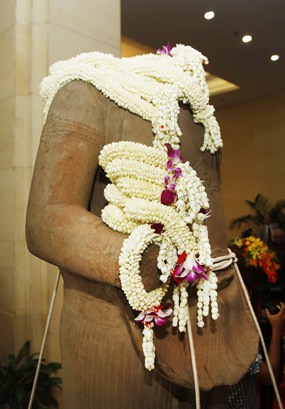Phnom Penh (AP) – Cambodia last week welcomed home a 10th-century Khmer statue that was looted during the country’s civil war before spending the past three decades at an American museum.
The sandstone Torso of Rama statue, which stands 62 inches (157 centimeters) high and is missing its head, arms and feet, was formally handed over at a ceremony in Phnom Penh attended by government officials, the US ambassador and the director of the Denver Museum of Art.
 The Torso of Rama, a 10th century stone statue, is decorated with bundles of jasmine flowers during a handing over ceremony in Phnom Penh, Cambodia, Monday, March 28. (AP Photo/Heng Sinith)
The Torso of Rama, a 10th century stone statue, is decorated with bundles of jasmine flowers during a handing over ceremony in Phnom Penh, Cambodia, Monday, March 28. (AP Photo/Heng Sinith)
The museum said it acquired the statue in 1986 from the Doris Weiner Gallery in New York City but only recently learned new facts about its provenance.
“We were recently provided with verifiable evidence that was not available to us at the time of acquisition, and immediately began taking all appropriate steps … for its return home,” Christoph Heinrich, the museum’s director, said in a joint statement with the Cambodian government.
Cambodia’s Secretary of State Chan Thani thanked the museum for voluntarily returning the piece, which he said shows its sensitivity to Cambodian culture.
“The return also highlights the serious looting in the past that had occurred in our country and the government’s efforts to repatriate those artifacts that left the country illegally, which are parts of our soul as a nation,” he said in the statement.
The statue will be returned to its home at the Prasat Chen temple on the Koh Ker temple complex in Siem Reap province, which is also home to the famed Angkor Wat complex.
It is the latest artwork returned to Cambodia in recent years. Among the galleries that have repatriated art are the Guimet Museum in Paris, the Metropolitan Museum of Art in New York, the Cleveland Museum of Art, Sotheby’s auction house, Christie’s auction house and the Norton Simon Museum in Pasadea, California.
Yim Nolson, an official in charge of Cambodian culture, said the statue was stolen during the civil war in the 1970s and later transported to the U.S.
“Now after a long journey, he is finally back home,” he said.




